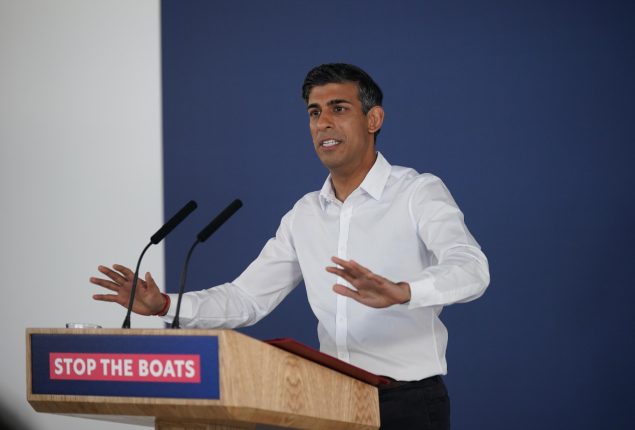US and China trade accusations of disinformation
China's Ministry of Foreign Affairs criticized a US State Department report for...

Rishi Sunak rallies Tories in last-ditch effort to avoid defeat
Rishi Sunak is set to convene with fellow members of the Conservative Party at their annual conference, which is likely to be the last one before the upcoming UK general election, where Sunak is currently projected to face defeat.
The Conservative Party finds itself in a challenging position as they are trailing behind the Labour Party in the polls by a significant margin.
Criticism has arisen within the party, with moderates disapproving of Sunak’s shift towards more right-leaning positions on issues such as immigration and carbon emissions reduction. Simultaneously, he is facing backlash from the party’s right-wing members who perceive his taxation and public debt policies as anti-conservative.
To compound Sunak’s challenges in uniting his party, the Institute for Fiscal Studies, the leading economic research institute in the UK, recently published a report forecasting that taxes will make up approximately 37% of the national income by the next election, marking the highest level since World War II.
Party conferences are vital events in the British political calendar, typically held in early autumn, where each party outlines its priorities for the upcoming year. For the ruling party, these conferences traditionally serve as occasions for members to rally around the leadership and unite against the opposition, somewhat shielded from wider political developments.
However, in this context, with an election on the horizon, Sunak, who was not even the Conservative Party’s leader a year ago, has inherited a party that appears divided and weary from prolonged time in power, seemingly lacking fresh ideas and already contemplating post-election introspection and blame-shifting. Both left and right factions within the party have publicly voiced their criticisms of Sunak on various fronts.
As an example leading up to this year’s conference, former cabinet minister Priti Patel expressed her view on the British channel GB News, characterizing the tax burden as “unsustainable” and unfavorably comparing Sunak to the tax-cutting former Prime Minister, Margaret Thatcher.
The Conservative-supporting Daily Mail newspaper ran a column titled: “Didn’t the Tories used to be part of tax CUTS?”
Rishi Sunak is likely to face vocal criticism from the environmentally conscious faction within his party due to a significant policy reversal last week concerning climate issues. Sunak decided to postpone the planned ban on the sale of new gasoline and diesel cars from 2030 to 2035 and pushed back against proposals to phase out gas boilers in homes.
Some Conservatives who are proponents of taking action on the climate crisis, including former Prime Minister Boris Johnson, have criticized Sunak’s decisions, emphasizing that the UK cannot afford to backtrack on its environmental ambitions.
What adds to Sunak’s discomfort is the uncommon occurrence of a sitting Prime Minister being openly criticized by a former Prime Minister. Johnson, who is at the center of a crucial internal power struggle within the Conservative Party, was compelled to resign due to a series of scandals last summer.
However, Johnson’s staunch supporters believe that Sunak’s resignation as Johnson’s finance minister was the final straw that led to Johnson’s untenable position. They suspect that Sunak’s motivation was to position himself for a future run at the top leadership role, an assertion Sunak denies.
This ongoing rivalry between Sunak and Johnson has created an unusual dynamic within the party. Johnson, long regarded as a favorite of the Conservative right, is, in many aspects, politically positioned to the left of Sunak. Nonetheless, his pragmatic approach to Brexit and cautious economic policies have led his allies to portray Sunak as a Conservative who has abandoned the party’s principles.
Furthermore, they argue that Sunak’s perceived betrayal of Johnson and his perceived shift towards centrism will be the downfall of the Conservative Party in the next general election, disregarding the damage inflicted on the party’s reputation and polling numbers during Johnson’s scandal-ridden tenure.
To counter these criticisms, Sunak has employed a strategy of appealing to Conservative MPs and voters by adopting more hardline stances. The recent policy reversal on climate issues is just one example.
He has prioritized cracking down on immigration, especially the route involving small boats crossing the English Channel from France. Additionally, he has faced accusations of fomenting division on the complex issue of transgender rights to win over his party members. Sunak has also aligned with the Johnson camp in criticizing “lefty lawyers” for opposing his proposals, including those related to immigration.
It’s worth noting that Sunak’s hardline approach may not necessarily resonate with the broader public, as most polls indicate. However, experts believe that Sunak is doubling down on his core Conservative base, viewing it as his primary strategy for retaining power in the next election.
“Sunak’s strategy of taking on issues like net zero and small boats is very much a ‘core vote’ strategy, aimed at securing the Conservative base,” says Will Jennings, professor of politics at the University of Southampton.
“This is not without risk – firstly because it’s not clear how large that core vote is without Boris Johnson, Brexit, and Jeremy Corbyn (the controversial, hard-left former Labour leader) and also because voters have other concerns right now – most notably the economy,” he adds.
To stay informed about current events, please like our Facebook page https://www.facebook.com/BOLUrduNews/.
Follow us on Twitter https://twitter.com/bolnewsurdu01 and stay updated with the latest news.
Subscribe to our YouTube channel https://bit.ly/3Tv8a3P to watch news from Pakistan and around the world.
Catch all the International News, UK News, Breaking News Event and Latest News Updates on The BOL News
Download The BOL News App to get the Daily News Update & Follow us on Google News.